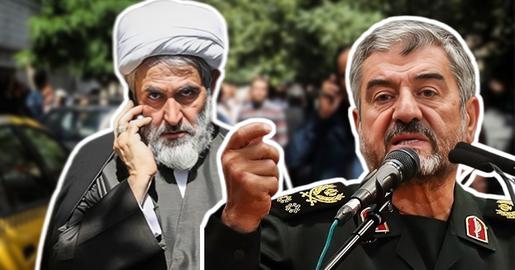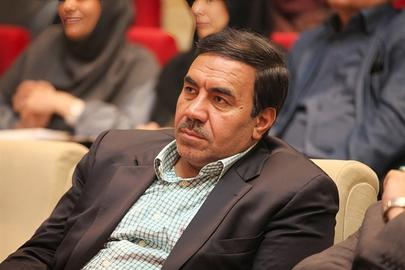In an exclusive audio file obtained by IranWire, Mohammad Javad Zarif, the former foreign minister of the Islamic Republic, reveals what he thinks of the hardliners who have "taken over" Iran in the past few years.
Zarif says two former top officials of the Islamic Revolutionary Guard Corps (IRGC) orchestrated the March 1 elections, and the two main hardliner candidates are "corrupt and liars."
Zarif also criticizes the reformists and accuses them of extremism and driving Supreme Leader Ali Khamenei towards the hardliners.
He says Hossein Taib, the former head of the Intelligence Organization of the IRGC, and Mohammad Ali Jafari, the former Commander-in-Chief, were "behind everything" during the recent elections.
The US State Department designated the IRGC as a foreign terrorist organization (FTO) in April 2019.
Zarif reveals that Jafari and Taib were at the forefront of the election process, overseeing the preparation of "the entire electoral lists."
Currently, Jafari serves at the IRGC's Baghiatallah Cultural and Social Base, while Taib acts as an adviser to Hossein Salami, the current commander-in-chief of the IRGC.
In the audio recording, Zarif reveals that he took part in the March 1 elections and cast his vote for Ali Abbaspour, whom he lauded as a "righteous and wise" politician he has known since their youth in the United States.
The complete version of Zarif's audio file, featuring other voices, is with IranWire.
The overall turnout in the March 1 elections plummeted to as low as 41 percent, marking a continued public disengagement from electoral processes.
Many voters abstained from casting their ballots despite the Iranian authorities' call for people to participate in the elections.
Most of Iran's disgruntled and disenchanted voters skipped the elections to the Parliament and Assembly of Experts.
They see the electoral process as a false display of democracy meant to validate a government that has not improved citizens' living conditions or personal freedom.
Expressing dismay at the low voter turnout, Zarif says, "People hoped that if they abstained from voting, their concerns would be heard. But who would heed these concerns?
"In 2020 and 2021, very few people voted. We are dealing with the central core of the establishment – not even the leader – which doesn't care about low voter turnout. After all, the leader is also part of the establishment," he says.
The former foreign minister says that people wanted to send a message by boycotting the elections.
"People aimed to convey a message, a message meant for figures like Aziz Jafari [former IRGC commander Mohammad Ali Jafari] or [Joe] Biden [US President]. Who else is willing to receive this message? Who has received the message?" he asks.
"If 10 million people in Tehran had each written only one name on the voting paper, those votes wouldn't have been counted as spoilt ballots, they would have represented 10 million distinct voices," he says in a reference to ballots marked with scribbles or names other than the candidates.
"Yet, in the initial round of the elections, Ghalibaf and Nabavian could not secure representation in parliament and would not be proud of being elected in the first round and Tehran would not have the shame of having Nabavian and Rasai as its representatives – proven to be liar and corrupt," he explains in a reference to three Tehran MPs.
"Rasai was disqualified in 2020, he has a pending court case. It's not a badge of honor for Tehran to have Rasaei as its representative," he adds.
During the March 1 parliamentary elections, Mahmoud Nabavian, a hardline politician, Mohammad Bagher Ghalibaf, the parliament's speaker, and Hamid Rasaei, former hardline MP, mentioned by Zarif, successfully garnered the necessary votes from the Tehran constituency and entered the parliament.
Regarding the 2021 presidential election, in which Ebrahim Raisi emerged victorious, Zarif mentions that Ali Larijani and Eshaq Jahangiri, disqualified candidates, along with Ali Akbar Salehi, who didn't register, would not be able to challenge Raisi and get enough votes.
Larijani served as parliament speaker for three terms, Jahangiri was the first vice president for eight years, and Ali Akbar Salehi served as head of the Atomic Energy Organization and foreign minister.
Zarif acknowledges that his popularity surpassed that of these three individuals but emphasizes that he didn't want to run in the 2021 elections and doesn't intend to do so in the future.
In the audio file, Zarif also talks about the determination of reformists to remove the leadership from the constitution, which he sees as a threat to the survival of Supreme Leader Ali Khamenei and the survival of the reformists themselves.
The complete text of Zarif's statements regarding the relationship between Khamenei and the reformists, and why Khamenie wears a Keffiyeh will later be published on IranWire.
visit the accountability section
In this section of Iran Wire, you can contact the officials and launch your campaign for various problems



























comments